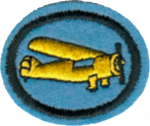Difference between revisions of "AY Honors/Airplane Modeling/Answer Key/es"
(Updating to match new version of source page) |
|||
| Line 193: | Line 193: | ||
===b. Ala=== | ===b. Ala=== | ||
| − | ===c. | + | ===c. Aileron=== |
| + | Ailerons are movable control surfaces that are present on the trailing edge of both the right and left wings of a plane. Each surface moves in opposite directions enabling a plane to roll right or left. For a plane to roll to the left, the left wing aileron moves upwards while the aileron on the right wing moves downwards. | ||
| − | ===d. | + | ===d. Rudder=== |
| + | This is the term used to describe the part of the tail that moves back and forth. This movement causes the tail of a plane to move which then turns the plane. | ||
| − | ===e. | + | ===e. Horizontal stabilizer=== |
| + | The horizontal "mini wing" at the tail section of the airplane. The elevator is attached to the horizontal stabilizer with hinges. | ||
===f. Soporte del ala=== | ===f. Soporte del ala=== | ||
| Line 209: | Line 212: | ||
===j. Propela=== | ===j. Propela=== | ||
| − | + | ===k. Diedro=== | |
| − | + | ===l. Elevator=== | |
| + | Elevator is the term used to describe a plane's horizontal control surface on the tail. This surface enables a plane to pitch upwards or downwards. When an elevator surface moves upwards, the tail moves downwards (the nose of the plane then points up) and vice-versa. Without an elevator, it is hard to control the altitude of a plane as you can't control the rise and fall of the nose of the plane. | ||
{{clear}} | {{clear}} | ||
| − | + | ===n. Vertical stabilizer=== | |
| + | The vertical fin which is part of the tail assembly of the airplane. The rudder is attached to the vertical stabilizer with a hinge. | ||
| − | + | ===o. V-Tail=== | |
| + | V-Tail aircraft are planes that have only 2 stabilization surfaces (in the shape of a V) instead of a conventional horizontal and vertical stabilizers. In a V-Tail aircraft, the 2 control surfaces of the V-Tail work together to give elevator and rudder responses. | ||
{{clear}} | {{clear}} | ||
Revision as of 03:05, 29 November 2020
| Aeromodelismo | ||
|---|---|---|
| Asociación General
|
Destreza: 1 Año de introducción: 1944 |
|
Requisitos
|
La especialidad de Aeromodelismo es un componente de la Maestría Artesanía. |
1. Construir y volar con éxito un avión de un kit de madera de balsa y papel, que sea propulsado por una banda de goma o por gas.
2. Construir un planeador con madera de balsa de un modelo prefabricado y observar sus características de vuelo en relación a la variable posición de las alas.
3. Hacer y volar con éxito 2 diferentes estilos de aviones utilizando hojas de papel de entre 20 centímetros y 35 centímetros de ancho y largo.
4. Definir, ubicar y explicar el uso de los siguientes elementos básicos:
a. Fuselaje
b. Ala
c. Aileron
Ailerons are movable control surfaces that are present on the trailing edge of both the right and left wings of a plane. Each surface moves in opposite directions enabling a plane to roll right or left. For a plane to roll to the left, the left wing aileron moves upwards while the aileron on the right wing moves downwards.
d. Rudder
This is the term used to describe the part of the tail that moves back and forth. This movement causes the tail of a plane to move which then turns the plane.
e. Horizontal stabilizer
The horizontal "mini wing" at the tail section of the airplane. The elevator is attached to the horizontal stabilizer with hinges.
f. Soporte del ala
g. Cabina
h. Motor
i. Tren de aterrizaje
j. Propela
k. Diedro
l. Elevator
Elevator is the term used to describe a plane's horizontal control surface on the tail. This surface enables a plane to pitch upwards or downwards. When an elevator surface moves upwards, the tail moves downwards (the nose of the plane then points up) and vice-versa. Without an elevator, it is hard to control the altitude of a plane as you can't control the rise and fall of the nose of the plane.
n. Vertical stabilizer
The vertical fin which is part of the tail assembly of the airplane. The rudder is attached to the vertical stabilizer with a hinge.
o. V-Tail
V-Tail aircraft are planes that have only 2 stabilization surfaces (in the shape of a V) instead of a conventional horizontal and vertical stabilizers. In a V-Tail aircraft, the 2 control surfaces of the V-Tail work together to give elevator and rudder responses.
- Categoría: Tiene imagen de insignia
- Adventist Youth Honors Answer Book/Honors/es
- Adventist Youth Honors Answer Book/es
- Adventist Youth Honors Answer Book/Skill Level 1/es
- Categoría: Libro de respuestas de especialidades JA/Especialidades introducidas en 1944
- Adventist Youth Honors Answer Book/General Conference/es
- Adventist Youth Honors Answer Book/Arts and Crafts/es
- Adventist Youth Honors Answer Book/Arts and Crafts/Primary/es
- Adventist Youth Honors Answer Book/Artisan Master Award/es
- Adventist Youth Honors Answer Book/Stage 0/es

